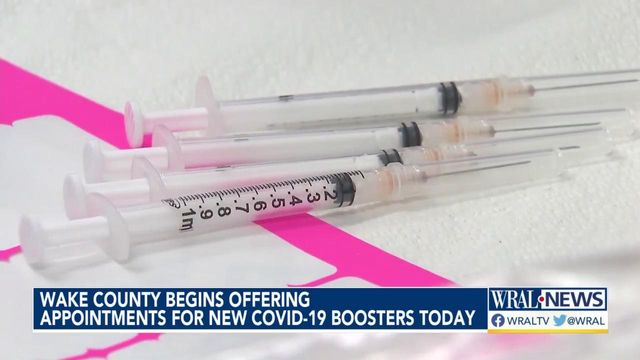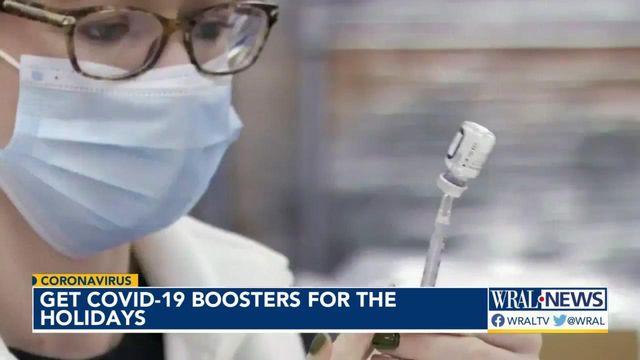FAQs: New COVID-19 booster shots
Updated vaccines from Moderna and Pfizer targeting the most widely circulating version of the omicron variant are now available.
Posted — UpdatedIt’s been a long slog that isn’t over yet—as temperatures begin to fall, cases of COVID-19 are expected to rise. Fortunately, updated vaccines from Moderna and Pfizer targeting the most widely circulating version of the omicron variant are now available.
The new booster is a bivalent vaccine, which means it has two parts, the original vaccine plus a new vaccine that provides coverage against the omicron variant, called BA.5, says UNC Health infectious diseases specialist David Wohl, MD.
“It is an updated COVID-19 booster that is designed to provide broader protection against becoming infected with COVID-19 compared to the previous, monovalent booster vaccines,” Wohl said. “Nothing is being taken away, only added.”
Here are answers to common questions about the new booster.
You are eligible for a booster with a bivalent vaccine if it has been at least two months since your primary series vaccination or a booster with any previous COVID-19 vaccine.
Anyone 5 years of age and older is eligible for the new bivalent COVID-19 vaccine made by Pfizer-BioNTech.
Anyone 6 years of age and older is eligible for the new bivalent COVID-19 made by Moderna.
Yes, for everyone 5 and older. As part of the authorization for the bivalent vaccines, the FDA discontinued the authorization of the previous monovalent COVID-19 Pfizer and Moderna boosters for ages 5 and up.
“The new boosters are going to provide greater protection from infection than the original vaccines that were not designed to tackle new variants. With BA.5 now the most circulating form of COVID-19 it makes sense to use the bivalent vaccines now and not the older vaccines,” Dr. Wohl says. “If you’re eligible for a booster now, take the booster. There is no downside.”
The bivalent booster you receive does not need to be from the same manufacturer that produced the vaccine you received for your primary vaccination or any previous booster.
“There is no real difference between shots,” Dr. Wohl says. “You should get the one that is available to you based on your age.”
If you’ve had COVID-19 anytime since the middle of July 2022, chances are you got infected with BA.5 and have some immunity to that variant. Experts recommend getting vaccinated anyway, about two months after you were infected to build up even stronger immunity to this and other potential variants, Dr. Wohl says.
“People infected with BA.5 recently probably now have good immunity to this particular variant. With the bivalent shot, they can boost this protection and likely expand the ability to respond to other variants, perhaps even those coming along,” Dr. Wohl says.
Both the new boosters from Pfizer and Moderna contain the original vaccines that have been given to millions of people and found to be safe and effective. They also have a new component that uses the same mRNA technology to get the body to make antibodies against the spike protein on the surface of the BA.5 variant of COVID-19. People who get infected with BA.5 make the same type of antibody all on their own.
Both companies have done studies in hundreds of people of a bivalent made up of the original vaccines and a vaccine against BA.1, which came along right before BA.5. These studies in people showed these bivalent vaccines were safe and produced good immune responses against the BA.1 variant. Other studies in mice show the BA.5-targeting bivalent vaccines to be effective and triggering a strong antibody response against BA.5. A recent study of the bivalent vaccine against BA.5 in people found the vaccine to be safe and to increase antibody levels against this variant to a greater extent than the original vaccines.
“At some point, we can no longer conduct large clinical trials of each new tweak of the vaccines. These studies take time, and there is a high risk that by the time we get the results, a new variant will emerge, and the data will become obsolete,” Dr. Wohl says. “To keep up against an ever-changing virus like COVID-19, we need to be nimble and quick. So, just as we have done for decades with the flu shot, we need to make COVID-19 vaccines that are designed to protect us from the version of the virus in circulation. The mRNA vaccines have proven themselves to be safe and effective.”
The new vaccine is available at local pharmacies, doctors’ offices and community health centers.
“Check with your local pharmacy or your clinic to see if they have the new bivalent vaccines,” Dr. Wohl says. Like previous vaccine and booster shots, the bivalent vaccine is free.
The new boosters will offer more protection against breakthrough infections of the latest variants than the previous shots. However, that does not mean they are a guarantee against COVID-19 infection.
“Viruses like the COVID-19 and flu virus evolve, and that has been happening since the start of the pandemic,” Dr. Wohl says. “Every living thing tries to make more copies of itself, and that’s what this virus is doing. What we see are changes in the virus that allow it to be more easily transmitted from one person to another person, where it can continue to replicate.”
The good news is that while cases may be rising, hospitalizations and deaths from COVID-19 are significantly lower than during last winter’s omicron wave.
“It tells you that even though people are getting infected and reinfected, they’re mostly not getting sick enough to require oxygen,” Dr. Wohl says. “That’s a big departure from what we were dealing with over the first year and a half before the vaccines came out. My hope is that we as a community and nation will become even more immune to COVID-19 such that we will be less likely also to not get even a mild infection. No one wants even the sniffles.”
• Credits
Copyright 2024 by Capitol Broadcasting Company. All rights reserved. This material may not be published, broadcast, rewritten or redistributed.






